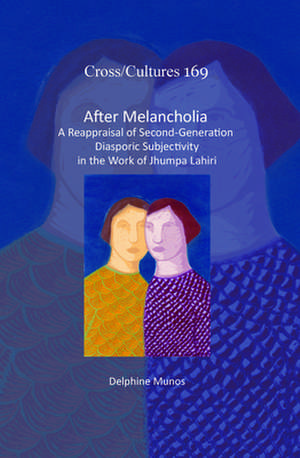After Melancholia: A Reappraisal of Second-Generation Diasporic Subjectivity in the Work of Jhumpa Lahiri: Cross/Cultures, cartea 169
Autor Delphine Munosen Limba Engleză Hardback – 31 dec 2012
Din seria Cross/Cultures
-
 Preț: 387.83 lei
Preț: 387.83 lei - 18%
 Preț: 842.69 lei
Preț: 842.69 lei -
 Preț: 325.74 lei
Preț: 325.74 lei - 18%
 Preț: 530.05 lei
Preț: 530.05 lei - 18%
 Preț: 620.52 lei
Preț: 620.52 lei - 18%
 Preț: 545.21 lei
Preț: 545.21 lei - 18%
 Preț: 923.06 lei
Preț: 923.06 lei - 18%
 Preț: 912.78 lei
Preț: 912.78 lei - 18%
 Preț: 676.05 lei
Preț: 676.05 lei - 15%
 Preț: 491.73 lei
Preț: 491.73 lei - 18%
 Preț: 529.87 lei
Preț: 529.87 lei - 18%
 Preț: 695.21 lei
Preț: 695.21 lei - 15%
 Preț: 529.11 lei
Preț: 529.11 lei - 15%
 Preț: 456.13 lei
Preț: 456.13 lei -
 Preț: 368.50 lei
Preț: 368.50 lei -
 Preț: 306.75 lei
Preț: 306.75 lei - 15%
 Preț: 456.33 lei
Preț: 456.33 lei - 18%
 Preț: 536.06 lei
Preț: 536.06 lei - 18%
 Preț: 885.52 lei
Preț: 885.52 lei -
 Preț: 402.01 lei
Preț: 402.01 lei -
 Preț: 401.92 lei
Preț: 401.92 lei - 15%
 Preț: 408.72 lei
Preț: 408.72 lei - 18%
 Preț: 711.48 lei
Preț: 711.48 lei - 28%
 Preț: 573.59 lei
Preț: 573.59 lei - 18%
 Preț: 698.59 lei
Preț: 698.59 lei - 18%
 Preț: 572.67 lei
Preț: 572.67 lei - 18%
 Preț: 788.35 lei
Preț: 788.35 lei - 18%
 Preț: 1095.77 lei
Preț: 1095.77 lei - 18%
 Preț: 766.64 lei
Preț: 766.64 lei - 18%
 Preț: 536.51 lei
Preț: 536.51 lei - 18%
 Preț: 514.12 lei
Preț: 514.12 lei - 18%
 Preț: 576.05 lei
Preț: 576.05 lei - 18%
 Preț: 576.05 lei
Preț: 576.05 lei - 18%
 Preț: 670.77 lei
Preț: 670.77 lei - 18%
 Preț: 727.82 lei
Preț: 727.82 lei - 18%
 Preț: 700.80 lei
Preț: 700.80 lei - 18%
 Preț: 724.05 lei
Preț: 724.05 lei - 18%
 Preț: 760.38 lei
Preț: 760.38 lei - 18%
 Preț: 604.39 lei
Preț: 604.39 lei - 18%
 Preț: 759.36 lei
Preț: 759.36 lei -
 Preț: 308.26 lei
Preț: 308.26 lei - 18%
 Preț: 608.03 lei
Preț: 608.03 lei - 18%
 Preț: 701.60 lei
Preț: 701.60 lei -
 Preț: 307.77 lei
Preț: 307.77 lei - 18%
 Preț: 639.51 lei
Preț: 639.51 lei - 18%
 Preț: 606.50 lei
Preț: 606.50 lei - 18%
 Preț: 536.26 lei
Preț: 536.26 lei
Preț: 465.45 lei
Preț vechi: 547.60 lei
-15% Nou
Puncte Express: 698
Preț estimativ în valută:
89.07€ • 93.18$ • 73.99£
89.07€ • 93.18$ • 73.99£
Carte indisponibilă temporar
Doresc să fiu notificat când acest titlu va fi disponibil:
Se trimite...
Preluare comenzi: 021 569.72.76
Specificații
ISBN-13: 9789042037403
ISBN-10: 9042037407
Pagini: 240
Dimensiuni: 155 x 235 x 18 mm
Greutate: 0.57 kg
Editura: Brill
Colecția Brill
Seria Cross/Cultures
ISBN-10: 9042037407
Pagini: 240
Dimensiuni: 155 x 235 x 18 mm
Greutate: 0.57 kg
Editura: Brill
Colecția Brill
Seria Cross/Cultures
Cuprins
Acknowledgements
Illustrations
Introduction
Diaspora’s Hereafters
Speaking from the End of the Line
Imagining Entangled Genealogies
Reaching Out Beyond Diaspora
Performing the Phantom Loss of the Motherland
Revenant Melancholy
Firing the Loaded Gun
Unassimilable Death: A History of Transgenerational Entanglement
Home Is Where the Haunt Is
The Return of the Dead Buried Within the Other
Kaushik’s Melancholic Crime
Kaushik’s Exile of Self
Kaushik’s Impossible Memory, or the Unreliable Narrator
Dead Mothers and Hauntings
Gothicized Repetitions and Haunted Beginnings
The Phantom, or Hema’s Intention
The Other Dead Mother
The Future of Diaspora
Afterwardsness, or the Possibility of Translating Oneself into the Future
Rome: The Postal Effect
Hema’s Failed Translations
Kaushik’s Failed Repression
Claiming the Mother’s Luggage
Into the Maternal Necropolis: A History of Guilt
The Ending as True Beginning
Conclusion
Works Cited
Index
Illustrations
Introduction
Diaspora’s Hereafters
Speaking from the End of the Line
Imagining Entangled Genealogies
Reaching Out Beyond Diaspora
Performing the Phantom Loss of the Motherland
Revenant Melancholy
Firing the Loaded Gun
Unassimilable Death: A History of Transgenerational Entanglement
Home Is Where the Haunt Is
The Return of the Dead Buried Within the Other
Kaushik’s Melancholic Crime
Kaushik’s Exile of Self
Kaushik’s Impossible Memory, or the Unreliable Narrator
Dead Mothers and Hauntings
Gothicized Repetitions and Haunted Beginnings
The Phantom, or Hema’s Intention
The Other Dead Mother
The Future of Diaspora
Afterwardsness, or the Possibility of Translating Oneself into the Future
Rome: The Postal Effect
Hema’s Failed Translations
Kaushik’s Failed Repression
Claiming the Mother’s Luggage
Into the Maternal Necropolis: A History of Guilt
The Ending as True Beginning
Conclusion
Works Cited
Index
Notă biografică
Delphine Munos is a F.R.S.-FNRS postdoctoral researcher in the Department of English and American Literatures at the University of Liège (Belgium). She has published in the fields of American and postcolonial literature, diaspora studies, and South Asian studies.
Recenzii
"Undoubtedly, the main strengths of After Melancholia is, on the one hand, Delphine Munos’s scrupulous psychoanalytical close reading of Jhumpa Lahiri’s work and, on the other hand, a new examination of the predicament of haunted diasporic identities. As the title of her book indicates, Munos explores how Lahiri uses melancholy to represent second-generation subjectivities haunted by impossible mourning and unclaimed legacies. According to Munos, the idea of a “return” is therefore understood as a process of accommodating diaspora’s spectral presences." - Jocelyn Martin in Recherche littéraire/Literary Research, vol. 33 (Summer 2017)
